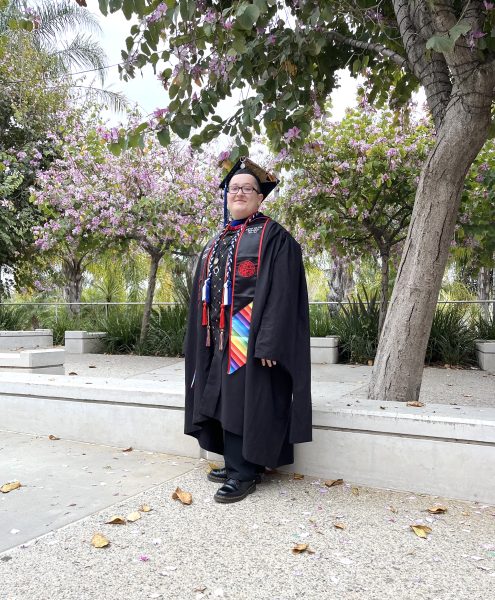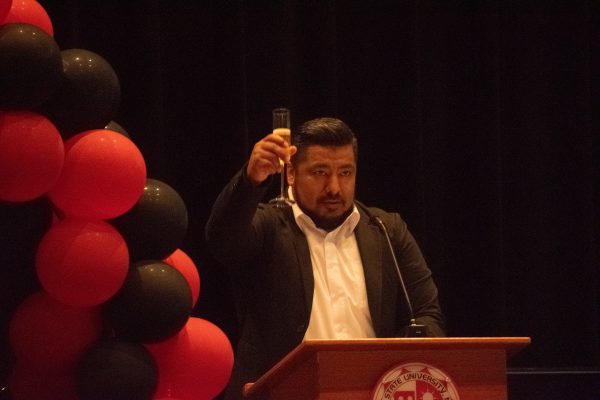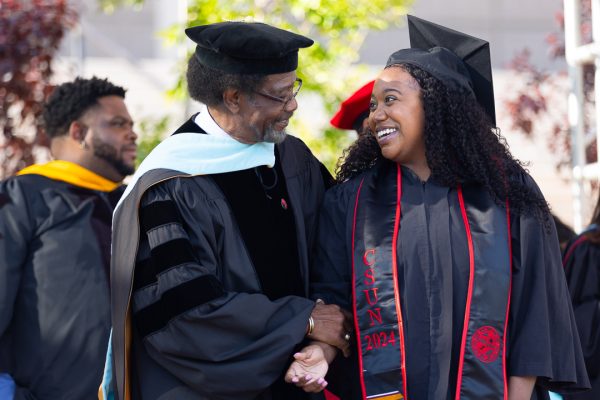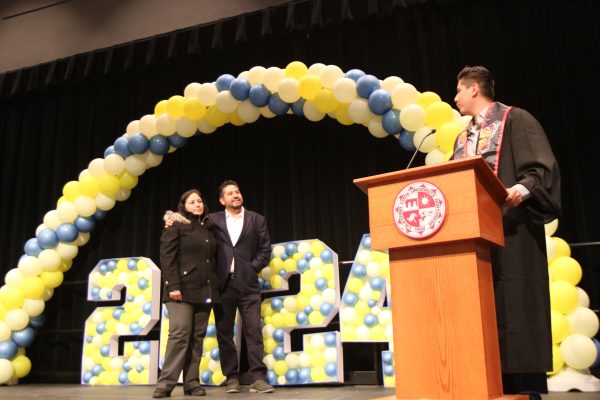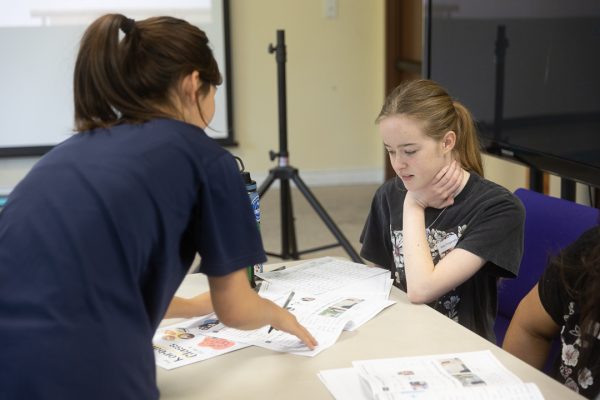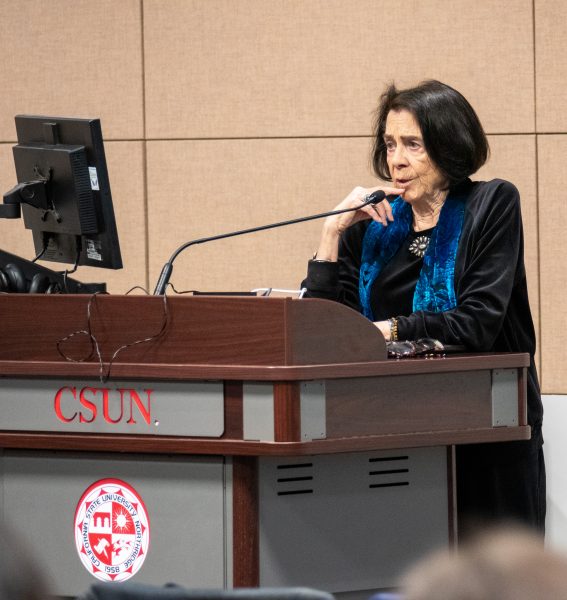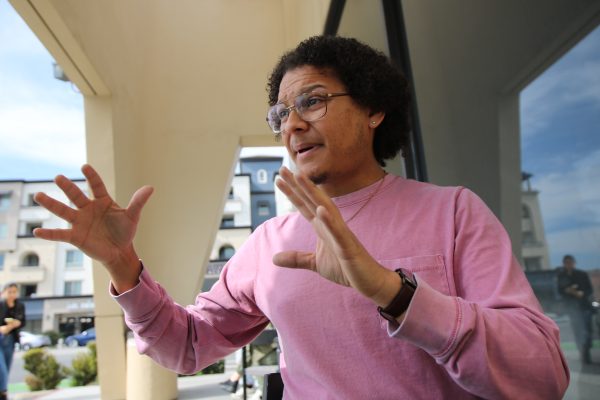President Harrison Q&A: CSUN fall 2020 fees will remain the same regardless of format
May 1, 2020
Here are the main takeaways from The Sundial’s Zoom Q&A session with CSUN President Dianne F. Harrison this week.
Cost of attendance will remain the same for the fall semester regardless of the format. (14:39)
Harrison said that the price of tuition and campus fees for the fall 2020 semester will remain the same, regardless of the modality.
“If we provide students with full academic credit for the courses that they take, regardless of the means in which they’re delivered… no portion of that tuition or mandatory fees will be reduced,” Harrison said.
Harrison acknowledged the view shared by a number of students and faculty that the quality of education is diminished through a virtual means of instruction.
“If you got a group of faculty and students in the room, you might have some disagreement over whether the quality or the value of a course that they took this term or in the summer, or in the fall, is the same regardless of modality,” Harrison said.
“I very much understand and appreciate the concerns about the value of your dollar,” she said. “Under any fall scenario, regardless of which way we go, I expect that our faculty will be offering robust student and academic support services regardless of the format.”
CSUN is still aiming for a commencement ceremony in the winter, but plans on having virtual recognition events this month in the meantime. (18:43)
According to Harrison, 97% of people surveyed on the question of CSUN’s commencement said they don’t want a virtual commencement.
Harrison said this is the reason why they’re still pushing for an in-person commencement in the winter. If it is not safe to hold an in-person commencement in the winter, she said they would consider pushing it to spring 2021.
She also wants to have virtual events to recognize graduates, faculty and staff before the semester ends.
“We don’t want to let this semester pass without doing something to recognize our outstanding graduates,” Harrison said.
A committee has been put together to come up with ideas for the virtual events. Student input is being weighed, according to Harrison.
“It’s not replacing in-person commencement. It’s simply acknowledging that there was a lot of great work that was done, and we want to recognize that,” Harrison said.
The CARES Act grant application is live. (0:33)
Earlier today, President Harrison emailed eligible students details on applying for the federal relief money. The application is available on the “Financial Matters” tab of the student portal. Eligibility is restricted to students who fit the federal student eligibility criteria.
Average award amounts will range from $308-$968. To determine the award amount for each student, students are divided into three categories based on financial need using the federal Estimated Family Contribution metric, Harrison said.
Students whose Expected Family Contribution is zero fall into the highest-need category and will receive the highest award amount. Harrison estimated that about 11,000 students fit into this category.
The second group is composed of students who qualified for federal student aid, but still have an EFC higher than zero. Harrison estimated that about 8,000 students fit into this category.
The third group is made up of students who didn’t qualify to receive federal student aid, but whose financial situations could have been impacted by the pandemic. The award amount for this category is $308. Harrison estimated that about 14,000 students fit into this group.
Each student’s application will state the amount that they’ve been awarded with, but students can request to receive more.
About 33,000 students are eligible to receive relief money, according to Harrison. The deadline for priority consideration is May 15. Students should expect their awards to be processed seven days after their application is approved, according to Harrison.
Harrison said that some portion of the second half of the $44.6 million the federal government allocated to CSUN will be reserved for student aid. That second half of the money has yet to be processed. The grants that were made available to students today are from the first half of the federal allocation.
Yesterday, the Department of Education awarded an additional $3.3 million to CSUN as part of relief the department is providing specifically to Historically Black Colleges and Universities and Minority Serving Institutions. CSUN qualified for the relief, because it is a Hispanic Serving Institution. The Department of Education does not require universities to designate any of this additional relief for students, but Harrison said that she intends for the majority of the $3.3 million to go toward student aid.
A non-federal relief package for undocumented, DACA and international students is on the way, but Harrison encourages these students to apply to the MataCare grant in the meantime. (10:50)
The CSU publicly announced its intent to provide non-federal relief grants to undoucmented students and international students.
Harrison said this relief will come from funds raised by each campus. Harrison said that CSUN has reached out to private donors to fund relief for these students. She said that in the meantime, students in these groups should apply to the MataCare emergency grant, a campus grant that precedes the pandemic and is open for all students to apply. MataCare is funded by private contributions.
Harrison said that students who are DACA, undocumented or international will be notified when funds specific to them are availabe. The funds will also be available to students who are enrolled exclusively in online courses. These students were also excluded from receiving federal relief.
The Sundial wants to hear from you. Next Friday, May 8, is our final Zoom Q&A with President Harrison. Please submit your questions to editor@csun.edu, with “Harrison Q&A Question Submission” in the subject line. You can also DM us your questions on Twitter and Instagram.
